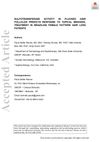Does Topical Minoxidil at Concentrations Higher Than 5% Provide Additional Clinical Benefit?
July 2022
in “
Clinical and Experimental Dermatology
”

TLDR Using more than 5% minoxidil can help hair growth more, but results vary and side effects may increase.
The document reviews the effectiveness and safety of using different concentrations of topical minoxidil for treating androgenetic alopecia (AGA). It cites several studies, including one with 393 men showing 5% minoxidil was more effective than 2% for improving nonvellus hair count. Another study with 66 patients found 15% minoxidil was significantly better than the 5% formulation at weeks 12 and 24. However, a study with 90 men found 5% minoxidil was superior in improving hair regrowth compared to 10% minoxidil and placebo. A study with women who didn't respond to 5% minoxidil showed a significant response in 60% of the participants when treated with 15% minoxidil. The document concludes that while higher concentrations of minoxidil can provide additional clinical benefits, the results can vary significantly among individuals, and adverse effects may increase with higher percentage formulations. Further controlled trials with larger sample sizes and longer follow-up durations are necessary to determine the optimal concentration of minoxidil for treating pattern hair loss.


















